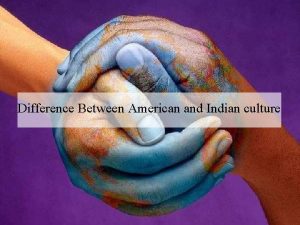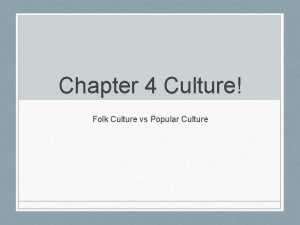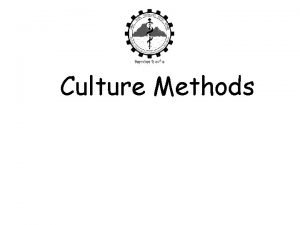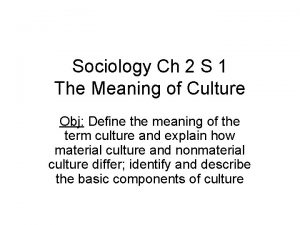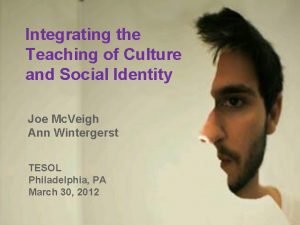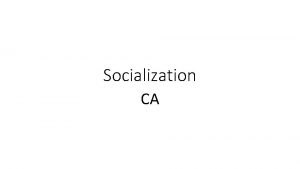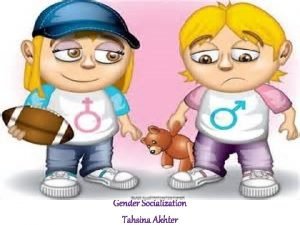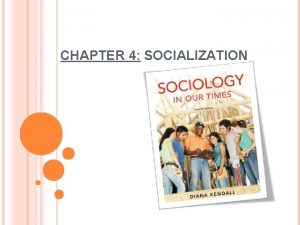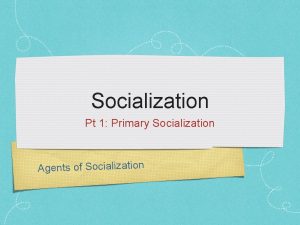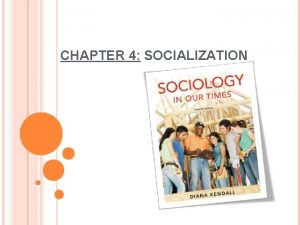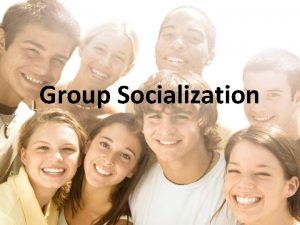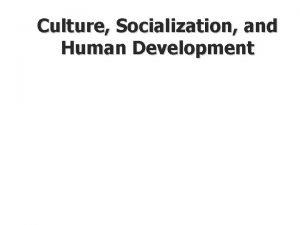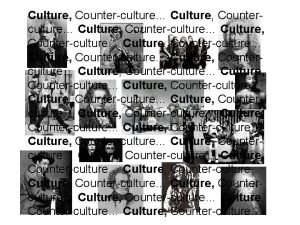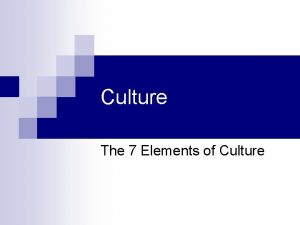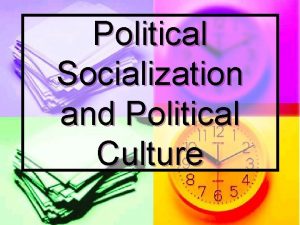Socialization Lecture 3 Socialization and Culture Socialization the














- Slides: 14

Socialization Lecture 3

Socialization and Culture • Socialization: the process through which we are taught and we learn the culture we live in; life-long process and informal/formal. – Culture includes a shared way of understanding and participating in the society we live in. • The key word is shared---this is done through social interaction. – Embedded in this sharing process is social control —reinforcing socialization through restraint, punishment, and rewards.

Types of Socialization – Primary socialization: focuses on early interaction processes that give children the necessary skills they need in the culture and society they live in. – Continuing socialization: ongoing interaction process through which we learn how to navigate the cultural we live in as adults. – Social Location Socialization: Depending on a variety of statuses, people acquire knowledge about what expects in terms of race, class, gender, sexuality, religion, etc.

Agents of Socialization – People, groups, social institutions that provide the information needed to learn the culture; transmitted through social interaction. – Family (Primary Agent) – Peers – School – Media (Rivals the family as primary agent)

Socialization and the Self • The Self: the reflective and reflexive ability of humans to take themselves as object of their own thought. • Dominated by interactionist theories

• Charles Horton Cooley: looking-glass self; our sense of self that comes from social interaction

• George Herbert Mead: role-taking through play and the generalized other through social interaction; I (subjective self) and me (objective self)

• WEB Dubois: Double Consciousness & two selves

Sociological Perspectives on Socialization • Nature Versus Nurture Debate: Questions whether behavior is instinctual or genetically determined or is it cultural and learned.

The Debate – Social Darwinism (Herbert Spencer): survival of the fittest and innate evolutionary superiority – Introspectionism (psychology): knowledge of self through consciousness and examining one’s own thoughts, feelings, and experiences. – Behaviorism (John B. Watson): self is known through observable behavior that can be manipulated by internal/external stimuli

Functionalist • Socialization must be carried out properly or the family will compromise the social integration process…cause social problems in education, crime, mental health problems, economy, politics, etc.

Conflict • In socialization, each agent of socialization has a differing degree of power and influence on certain children, which allows advantages and disadvantages…. for example popular culture and high culture, or private school versus poor public schools.

Interactionist • People play a role (have agency) in the process of socialization, which means they do not experience agents’ influence in the same way and that at some level we are also influencing the socialization agent through social interaction…for example breaking the rules, underground fads and styles that become mainstreamed.

Other theoretical considerations… • Feminist Theory: Gender socialization is a negotiated and contested process where gender is defined and redefined, but has consequences based on gender performance • Intersectionality: People occupy multiple social locations simultaneously, which means they participate in various streams of socialization and often endure conflict, collisions, and consequences that effect their survival.
 01:640:244 lecture notes - lecture 15: plat, idah, farad
01:640:244 lecture notes - lecture 15: plat, idah, farad Example of pop culture
Example of pop culture Batch culture vs continuous culture
Batch culture vs continuous culture American vs indian culture
American vs indian culture Stroke culture method
Stroke culture method Folk culture and popular culture venn diagram
Folk culture and popular culture venn diagram Leisure
Leisure Anaerobic media
Anaerobic media Folk culture and popular culture venn diagram
Folk culture and popular culture venn diagram Stroke culture method
Stroke culture method Lawn culture
Lawn culture Surface culture deep culture and esol
Surface culture deep culture and esol Individual culture traits combine to form culture patterns.
Individual culture traits combine to form culture patterns. Batch culture vs continuous culture
Batch culture vs continuous culture Characteristics of collectivism
Characteristics of collectivism



